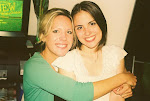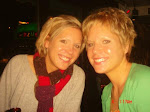
Every night I lay on my front porch with my host family. Ajai has her skinny arms around me; Landing snoring, Sutay lying on his cardboard, and Binta Badji my host mother still cracking jokes till the morning light. We lay on a mat in the night heat and I watch the rain come down. The rain is beautiful in Africa, the clouds roll in from miles away. We sit and watch for hours. Women bathe embracing the rain as some children run from compound to compound sliding in the mud….this is their Disneyland.
My family has been struggling; we are on ground zero for the food crisis. The children in my compound are down to one meal a day consisting, without fail, rice and palm oil. They are malnourished and hungry. We need help, but how? I try to explain to my village about the crisis but they don’t have the education and knowledge to understand. Peace Corps has been working with World Food Program to get rice seed delivered. I hear they are coming soon with the seed, we are waiting and ready to plant. Here I will be farming and trying to help the locals sustain themselves. Planting gardens and trees around my community, the hospital, and school. Planting intensive Moringa beds, working in the coos and rice fields, we are doing it all…and fast. But what I feel is needed the most is for America to change its ways. Start a garden, walk or bike to work, carpool, buy local produce, and donate funds or lend a helping hand to these countries in need. These people here are poor, and they are trying to survive. If you want more information on how to help or info on the food crisis see link below.
http://www.wfp.org/english/: Donate to WFP. This progarm delivers rice to local schools and helps feed the children. You or your company can donate
Besides the food crisis issue hitting my community hard, I have many projects I have been working on lately. Below is what I have been doing with my time here in The Gambia the past few months.
·
Myork festival. A few weeks back was a female circumcision festival in a nearby village. This festival happens once every ten years. Girls ranging from ages 5-20 go to the bush to get circumcised. They are there for about 4 days. During this time there is a large party going on in village. Grass huts are set up in each compound for all the women that come from neighboring villages. When night falls dancing, drumming and traditional Jolla songs are preformed. At an event like this any man is free to sleep with any women, even if she is married. I went to this event to see for myself what is going on. It is really sad that men are treating women as objects. The women don’t know better because here they have no choice, and events like this are their culture and tradition. When does this end? These women are getting raped and cut and there is no one to stop it here. This is the biggest human rights violation going on in the world right now.
I have decided that because of this event to hold an aids clinic and talk. I assume pregnancy rates and HIV/AIDS will skyrocket in the next few months. In the next few weeks I am holding a clinic to get my community tested and informed on the disease.
.JPG)
.JPG)
·
Gardening. In my local village I have started planting with the rains here. Planting yellow cassia, citrus, pigeon pea, and moringa along the fence. I am working with the women to start an intensive moringa bed for each compound. My village loves it and the women are always open to new ideas. In my backyard I have been continuing my tree nursery and planting. Cassava, Pepper, Moringa, Bananas, and Bamboo. I will take pictures of my gardens and inform you on how everything turns out.
·
Recycle. After teaching environmental classes at the primary school for the past few months at the end of the year I had all the children bring in recyclable products. We had over 300 plastic bags! I taught the children how to make rope. It went great and they are all very good. We will soon be making baskets and mats. But for now, the kids use them as new jump ropes.
.JPG)
.JPG)
·
Hospital planting. I am working on a project to landscape the local hospital. A project like this is needed in my community. People get sick, they are admitted, but their diet consists of rice and oil. Soon, in the next month, we hope to plant mango, citrus, and cashew orchards, have a large garden, intensive Moringa bed, new street trees, add nitrogen fixing trees for soil improvement, and plant rice, coos, corn, and cassava so the hospital can sustain itself. It is very important that the hospital adds these vegetables to the patient’s food bowl. It is a great project for me to try my hand at landscape architecture in a developing country.
·
Scorpions. Rain brings out wild animals in the bush. I have killed 5 scorpions in my hut in the past 2 days. If it stays at this rate I am sure to get bit. I will keep you updated.
-
Food Bowl. My family serves me palm oil and rice..everyday. The Myork festival we got served goat and rice. It is one of the best meals I have had in The Gambia. Here we eat on the floor, have one bowl, and with our right hand. I have also been experimenting at site making tea with different spices.
.JPG)
.JPG)
·
River. I have been going to the river every night around sunset with my host sister. It is beautiful. We meet other local kids there and they bathe before the sunset. We sometimes try to fish by throwing cloth down in the water and seeing if a small fish is stuck to it. I am still trying to convince Ajai that this does not work. But it is fun….
.jpg)
 · Environmental Education
· Environmental Education. Took grade 4 and 5 students from the Western Division on a field trip to Kandali Game Park and Farm. Here we saw zebras, crocs, camels, and hyenas. The kids and teachers loved it. We then went to Bwiam where we learned about environmental practices in The Gambia. The kids learned about different tree species and planting techniques.
·
Tree Planting Festival. I am holding the first annual tree planting festival at the local school. We will be out planting about 20-30 mango trees for an orchard and plant around their football field. It should be a fun event and I hope to continue it. We will be planting many trees that my environmental club has kept in our nursery. Should be good times.
Things here are good. I am keeping very busy with projects but balancing it well with bike trips, yoga, and visiting friends. It is hard, and hot. I have my down days when I question everything. I see the hunger, the poverty, and the struggle. But I love it here because of its challenge and the difficulties of things. And now, it is normal to me, it is life. I couldn’t imagine being in America, all the choices and the fast paced society. Here we are on it…slowly, slowly.
.JPG)
.jpg)
.JPG)
.jpg) A few Thanks…
A few Thanks… · Care packages I received lately. Mom and dad, Doblecki’s. I really appreciate it! J
· Darian Book Aid for donating environmental science, gardening, and English books to my local school. We really appreciate it, and I will use them as teaching aids for next year.
Congratulations…..· Alexs and Andre for recently getting married. I wish you the best of luck. Congrats and I miss you both.
 I recently have been given the opportunity to work in western Tanzania. I will be helping with the Tanzania Lighting and Power project with the company Dissigno. I will be heading over to Tanzania in mid March. Here is a link to their blog:
I recently have been given the opportunity to work in western Tanzania. I will be helping with the Tanzania Lighting and Power project with the company Dissigno. I will be heading over to Tanzania in mid March. Here is a link to their blog:
























 Nightly I find her hiding behind my front porch jumping out to scare the small children like a ten year old girl playing tag. She chases the children with a sugar cane stick in the dark. I can only see her eyes, but I can hear her cackle for miles. Binta, she hides her anger through laughter, where Teneng (my brother’s wife), doesn’t hide a thing. She yells daily at the children, and at me. I will not lie, I am scared of her. The comments she makes are fierce and I don’t want to be around her when she is back from a day in the field. I have seen her lau
Nightly I find her hiding behind my front porch jumping out to scare the small children like a ten year old girl playing tag. She chases the children with a sugar cane stick in the dark. I can only see her eyes, but I can hear her cackle for miles. Binta, she hides her anger through laughter, where Teneng (my brother’s wife), doesn’t hide a thing. She yells daily at the children, and at me. I will not lie, I am scared of her. The comments she makes are fierce and I don’t want to be around her when she is back from a day in the field. I have seen her lau gh twice, both times forced where I can see her soul crying behind her smile. Daily I watch her pound the rice with force, and can hear her screams frommiles over the beating rhythm of the pestles. She is hurting, I don’t know what she has been through, and probably never will, but she has an old, tired soul and needs a rest. Both women I extremely admire. I can only hope to be old one day with Binta’s profound wrinkles and Teneng's heartbreaking strength. To travel through life unscarred and intact, not an option here in The Gambia, nor for me.
gh twice, both times forced where I can see her soul crying behind her smile. Daily I watch her pound the rice with force, and can hear her screams frommiles over the beating rhythm of the pestles. She is hurting, I don’t know what she has been through, and probably never will, but she has an old, tired soul and needs a rest. Both women I extremely admire. I can only hope to be old one day with Binta’s profound wrinkles and Teneng's heartbreaking strength. To travel through life unscarred and intact, not an option here in The Gambia, nor for me.
.jpg)
.jpg)
.jpg)
.jpg)
.jpg)
.JPG)
.jpg)
.jpg)
.jpg)
.jpg)
.jpg)
.jpg)
.jpg)
.jpg)
.jpg)
.jpg)
.jpg)

.JPG)
.JPG)
.JPG)
.JPG)
.JPG)
.JPG)
.jpg)

.JPG)
.jpg)
.JPG)
.jpg)